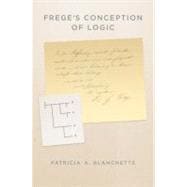
Note: Supplemental materials are not guaranteed with Rental or Used book purchases.
Purchase Benefits
What is included with this book?
| Acknowledgments | p. xi |
| Note on the Cover | p. xiii |
| A Note on Citations | p. xv |
| Introduction | p. 3 |
| Logidsm and Conceptual Analysis | p. 7 |
| Introduction to Analysis and Proof | p. 7 |
| Analysis and Proof in 1879 | p. 12 |
| Derivation, Proof, and Definition | p. 12 |
| Conceptual Analysis | p. 13 |
| Analysis in 1881 | p. 18 |
| Analysis in 1884 | p. 19 |
| Grundgesetze | p. 22 |
| The General Picture | p. 23 |
| Thoughts | p. 28 |
| Thoughts and Language | p. 28 |
| Sense and Reference | p. 37 |
| The Structure of Sense | p. 39 |
| Thoughts and Language Again | p. 45 |
| Where we are | p. 50 |
| Thoughts and Sharp Boundaries | p. 55 |
| The Issue | p. 55 |
| The Texts | p. 56 |
| Piecemeal Definition and New Objects | p. 62 |
| Ordinary Discourse | p. 68 |
| Caesar | p. 70 |
| Quantification | p. 72 |
| Conclusion | p. 75 |
| The Analysis of Arithmetic | p. 77 |
| The Issue | p. 77 |
| ANalysis as Thought-Preserving? | p. 79 |
| Reference-Preservation and Analysis | p. 82 |
| Dummett on What's Preserved | p. 87 |
| What's Preserved | p. 89 |
| The Case of Directions | p. 89 |
| Numbers | p. 92 |
| Arithmetic | p. 95 |
| Alternative Reductions | p. 101 |
| Conclusions | p. 102 |
| Analysis and Consistency: The Case of Geometry | p. 108 |
| Introduction | p. 108 |
| Frege-Hilbert | p. 109 |
| Hilbert's Method | p. 110 |
| Frege's Objections | p. 112 |
| Consistency And Concepts | p. 121 |
| Analysis and Consistency | p. 123 |
| The 1906 Passage | p. 125 |
| Ultimate Analyses? | p. 128 |
| Concluding Remarks | p. 130 |
| Frege and Models | p. 135 |
| Models and Consistency | p. 135 |
| Models and Entailment | p. 137 |
| Implications | p. 144 |
| Summing Up | p. 146 |
| Metatheory | p. 149 |
| Frege's Metatheory | p. 149 |
| Universalism and Metatheory | p. 156 |
| The Issue | p. 156 |
| Internal Tensions | p. 162 |
| Soundness, Completeness, and Consistency | p. 165 |
| Categoricity | p. 167 |
| Conclusion | p. 170 |
| Conclusion | p. 175 |
| Bibliography | p. 183 |
| Index | p. 189 |
| Table of Contents provided by Ingram. All Rights Reserved. |
The New copy of this book will include any supplemental materials advertised. Please check the title of the book to determine if it should include any access cards, study guides, lab manuals, CDs, etc.
The Used, Rental and eBook copies of this book are not guaranteed to include any supplemental materials. Typically, only the book itself is included. This is true even if the title states it includes any access cards, study guides, lab manuals, CDs, etc.